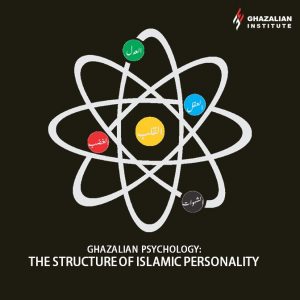 Ghazalian Psychology: The Structure of Islamic Personality
Ghazalian Psychology: The Structure of Islamic Personality
Al-Ghazali’s concept regarding the structure of the development of personality has some close resemblance when compared to the view of psychoanalysis regarding the structure of personality. Freud understands the id, ego, and super-ego as a great system of personality. According to him, a healthy individual is the manifestation of a harmonious relationship between those three systems which forms a coherent organization which is working cooperatively so that the individual could perform satisfying and effective transactions towards the environment, in which the purpose of the transactions is the fulfilment of basic needs.
In Lecture XXXI (1932) The Anatomy of the Mental Personality, Freud considers ego as the same as reason and id as the same as passion.
“…In popular language, we may say that the ego stands for reason and circumspection, while the id stands for the untamed passions.”
The id has the function to fulfill the primordial need of life which is also called the principle of pleasure. This principle of pleasure is a universal inclination which could be found in all living being in surviving its life whenever facing external and internal disturbances. In al-Ghazali’s view, the disturbances (‘awa’iq) which are coming externally are the world and creatures, whereas the internal disturbances which are coming internally are the appetitive soul and devil. The concept of id, in al-Ghazali’s structure, is the appetitive soul (nafsu). Meanwhile, the appetitive soul has two forms that are syahwat and ghadab. Syahwat is the impulse to acquire benefits or to feel pleasure. Among its forms are, according to Freud, life instinct or eros which ensure survival and reproduction, such as hunger, thirst, and sexual instinct. Whereas ghadab is the impulse to protect oneself from something that may harm or which bring suffering. It could be in the form of aggressive and destructive actions towards oneself and others. Freud called it the death instinct or Thanatos.
The concept of ego refers to the function of governing and controlling the id and superego and building relationships with the external world. When ego plays its roles wisely, and harmoniously, then the adjustment with the external world will be built. If the ego serves and submits too much to the power of the id, superego or the external world, it resulted in disharmony and misadjustment. Whereas, ego is ‘aql (intellect) in al-Ghazali’s concept, and it is in harmony with what Freud said, that to harmonize the soul, the appetitive soul must submit and obey ‘aql. Al-Ghazali cited the Qur’an that “the (human) soul is certainly prone to evil unless my Lord does bestow His Mercy“(Yusuf [12]: 53). Differed from Freud, al-Ghazali views the submission of the intellect to the ‘super ego’, in this case, is ‘adl (justice) would not create disharmony, instead it creates justice and good well-being.
The superego, according to Freud, is the internal representation of traditional values and ideals from society. The superego strives for perfection, not pleasure. Its main concern is to decide whether something is right or wrong according to the moral norms admitted by society. The concept of superego in al-Ghazali’s thought is the power of ‘adl (justice) which is sourced from the Syari’ah of Islam and noble and excellent character (akhlaq). The concept of ‘adl is more universal, more established and everlasting until the end of times in guiding man’s behaviour than the concept of superego which inclines towards societal values characterized as local wisdom. The cases such as drunkard, fornication, and LGBT, if it is framed with the concept of superego, will be considered as relative values due to the influence of culture and custom. But, it is not the case in the frame of concept of ‘adl as a guidance and direction of life, as worried The Prophet SAW for his people “I am so worried about the people after me of three things. First, the misguidance of the appetitive soul. Second, following the syahwat of the stomach and sexual. Third, negligent after knowing.”
One of Freud’s controversial opinions on the structure of personality is the making of sexual instinct the most important life instinct. Whereas in al-Ghazali’s concept, the sexual instinct is part of the appetitive soul which is mubah (permissible) with the conditions of restraining and releasing which must be based on the Syari’ah law, “And who is more astray than one who follows his own lusts, devoid of guidance from Allah? For Allah guides not people given to wrong-doing” (al-Qasas [28]: 50).
Freud made the id as the centre of personality and as the true psychological reality. Through the concept of id, Freud could be assumed the opinion that man is moved by something which is non-conscious. In Islam, the purpose of man’s creation is to worship Allah Ta’ala, and the conditions to worship Allah Ta’ala are having consciousness and intellect. So, how is it possible that one could perform worship in a good manner if he is moved by a non-conscious state coming from the lowly aspect which originated from the id? In al-Ghazali’s thought, qalb or the heart is the centre of personality which governs the body and its actions and is an entity which knows and within which there is yaqzhah in the form of consciousness of goodness. It is qalb that is the true self which has been burdened with the duty to worship Allah Ta’ala.
For al-Ghazali, id (syahwat and ghadab) is not the origin of behaviour. Instead, it is a tool or vehicle for qalb to achieve happiness (sa’adah) in the worldly life which prepares for happiness in the hereafter. It is like in the case of a hunter who is masterful in controlling his horse chasing a target guarded by his dog, and indeed his hunting will bring a good result. But, if the hunter is not masterful (i.e., weak intellect), the horse is wild (his syahwat is not controlled) and the guarding dog is not trained (untrained ghadab), then the hunting will be fruitless and will only bring suffering (syaqawah).
To help the understanding of the psychological thought of al-Ghazali, the writing in this work will be arranged using the arrangement of modern psychology by gathering al-Ghazali’s thought in the field of psychology and then it is grouped within those patterns such as the structure of development of character, psychopathology and its treatments, and also including the development of modern psychology which are in line with al-Ghazalis’ thought. The concept of psychology (‘ilm an-nafs) is scattered in several of his works, among which: ihya ‘ulumuddin, mizan al-‘amal, ma’arij al-quds fi madarij ma’rifat an-nafsi, minhaj al-‘abidin, misykat al-anwar, mi’raj as-salikin, raudha at-thalibin wa ‘umdah as-salikin, khulasah at-tsanif fi at-tasawuf, al-qistas al-mustaqim, munqidz min ad-dhalal, al-arba’in fi ushul ad-din and tahafut al-falasifah.
Ricky Firmansyah
Director of Ghazalian Institute
Founder of Ghazalian Psychology
Islamic Muslim Mental Health Coach
